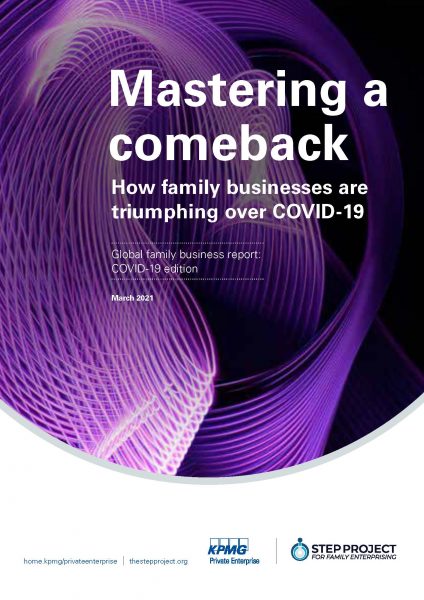Identifying the Right Talent is Essential for Family Firms in Hong Kong and Mainland China, Finds KPMG/STEP Project Global Consortium Joint Survey

Next generation involvement and greater transparency required to grow a more agile and resilient workforce and embrace change
Family businesses in Hong Kong SAR and mainland China, predominantly managed by the first generation and restricted by a relatively smaller pool of family talent, showed weaker human capital in terms of management knowledge and skills when handling the COVID-19 pandemic when compared with other markets, according to KPMG and the STEP Project Global Consortium’s latest global analysis.
The report, titled Mastering a comeback: How family businesses are triumphing over COVID-19, includes insights from nearly 2,500 family businesses and more than 500 non-family businesses from Asia Pacific (including Hong Kong SAR and mainland China), Europe, The Americas, Middle East and Africa, and demonstrates how the unique structure of family businesses has empowered them to respond to the impact of COVID-19.
Eighty-seven percent of global family firms that responded to the survey are led by family CEOs, which reflects a high level of family involvement in day-to-day decision-making. Many recognised that they did not have sufficient contingency plans in place to deal with a major, unexpected event like COVID-19. Others have realised that it is important to nurture the next generation and succession planning is becoming a more urgent priority to ensure the right leadership is being prepared to pick up the reins and guide a new strategic direction successfully.
With 65% of family firms in mainland China still managed by the first generation, it is important to focus on strengthening human resources through engaging external talents including their employees or nurturing the next generation. However, the survey finds firms in mainland China and Hong Kong SAR led by the incumbent generation display a cultural tendency to exercise centralised decision-making so as to solve issues quickly, reducing the need to involve multiple parties.
Karmen Yeung, Partner, National Private Enterprise Leader, KPMG China, notes: “The level of concentration of family ownership has a great deal of influence on the strategies and actions that are taken. For a family business, what matters is whether or not the family has to go through a lot of evaluation to determine if their decisions achieve the family’s purpose. The more dispersed the family ownership, the more time it takes for thorough communications and open discussions before decisions can be made. As a result, the speedy decision-making that family businesses are generally known for may be lost in the process.”
Hong Kong SAR and mainland China firms followed more or less the global trend in deploying three primary strategies to address COVID-19 – exercising patience, business transformation and corporate social responsibility. The study also suggests that the pandemic could be treated as a gift of time. With a slowdown in their business operations, some family business leaders found they had the time to diversify, to explore ideas for new products, new markets and extensions of their businesses that had been simmering in the background for years.
In fact, global respondents show family firms were 42% more likely to deploy a business transformation strategy than non-family firms, and that increased to 45% with multiple generations in the firm. Many also took the time to look seriously at ways to streamline their operations, including enhanced governance and accelerating the implementation of new digital solutions.
Sylvene Fong, Partner, Head of Private Enterprise, Hong Kong, KPMG China, notes: “As family businesses begin to grasp how the pandemic is altering the business landscape and the importance of adopting digital solutions for their companies to stay relevant, younger generations of the family are increasingly being tasked with exploring ways to digitally transform the family’s business operations, or engage in the development of new technology products or service offerings to make the business fit for the future.”
The survey also reveals the pivotal role that multiple generations of the family have played in their response to COVID-19. When two or more generations of the family are involved in the business, next-generation family members have helped to advance two critical agendas: their firms’ rapid digital advancement and putting ESG in the strategy spotlight.
Prof. Kevin Au, Director, Centre for Family Business at The Chinese University of Hong Kong (CUHK) Business School, comments: “During the pandemic, uncertainty promoted ‘what if’ discussions and demanded critical reviews of downside and upside scenarios for the future of many family businesses. In some cases, this included examining the family’s ownership structure. Families-in-business can be agile in redesigning their structure, such as initiating new projects and spinning off a new venture to give the family more flexibility to launch new initiatives.”
Transparency is critical to employees as they look for information to reinforce trust in their management and disconfirm rumour in the organisation. However, the survey finds business leaders in Hong Kong SAR and mainland China in general tended to reduce information sharing with their employees during COVID-19, which was critical for managing the situation, compared with firms in all other regions. With their collective strong cultural preference for face-to-face work, family firms also tended to be less inclined to allow employees to work remotely during the pandemic as compared with other regions. This reflects that they find it harder to embrace change and adapt their operational model accordingly.
Yeung, concludes: “Employees may be able to come up with bottom-up approaches to solve operational issues or even bring up innovative strategies. While Chinese business leaders may be inclined to take all the burdens on their shoulders, it is important for them to learn how to share some burdens with their employees by sharing critical information, which they will see as an act of trust by their leaders.”
About KPMG China
KPMG member firms and its affiliates operating in Mainland China, Hong Kong and Macau are collectively referred to as “KPMG China”.
KPMG China is based in 28 offices across 25 cities with around 12,000 partners and staff in Beijing, Changsha, Chengdu, Chongqing, Foshan, Fuzhou, Guangzhou, Haikou, Hangzhou, Hefei, Jinan, Nanjing, Ningbo, Qingdao, Shanghai, Shenyang, Shenzhen, Suzhou, Tianjin, Wuhan, Xiamen, Xi’an, Zhengzhou, Hong Kong SAR and Macau SAR. Working collaboratively across all these offices, KPMG China can deploy experienced professionals efficiently, wherever our client is located.
KPMG is a global organisation of independent professional services firms providing Audit, Tax and Advisory services. We operate in 147 countries and territories and have more than 219,000 people working in member firms around the world. The independent member firms of the KPMG global organisation are affiliated with KPMG International Limited (“KPMG International”), a private English company limited by guarantee. KPMG International and its related entities do not provide services to clients. Each KPMG firm is a legally distinct and separate entity and describes itself as such.
In 1992, KPMG became the first international accounting network to be granted a joint venture licence in mainland China. KPMG was also the first among the Big Four in mainland China to convert from a joint venture to a special general partnership, as of 1 August 2012. Additionally, the Hong Kong firm can trace its origins to 1945. This early commitment to this market, together with an unwavering focus on quality, has been the foundation for accumulated industry experience, and is reflected in KPMG’s appointment for multi-disciplinary services (including audit, tax and advisory) by some of China’s most prestigious companies.
About the Successful Transgenerational Entrepreneurship Practices (STEP) Project Global Consortium
The STEP Project Global Consortium is a global applied research initiative that explores family and business practices within business families and generates solutions that have immediate application for family business leaders. The STEP Project Global Consortium aims to be a leading global family business research project with an international reputation. The research insights are specifically drawn to be of relevance to developing new theoretical insights that can offer novel and valuable best practices recommendations to the business stakeholders and the practice community at large. Having a global worldwide orientation, the STEP Project Global Consortium offers networking opportunities for researchers, family business owners and consultants coming from five continents.
About Centre for Family Business of CUHK Business School
The Center for Family Business was established by the Asia-Pacific Institute of Business (APIB) at CUHK in 2012, since hosting activities and programs on family entrepreneurship and succession in 2006. Our research center severs as a major driver of the family business activities in Hong Kong, China, and most part of the Asia-Pacific region. Hence, now a platform for collaboration between family business, advisors, consultants, academics, and policymakers.
We focus our research on trans-generational entrepreneurship, family business successions, governance of family firms, family philanthropy and family business strategy. We also support global research projects and invites collaborators with the same goal.
This press release was first published on the KPMG China website on 17 May 2021.



